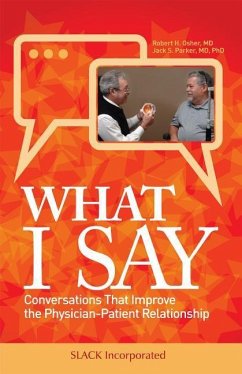- Broschiertes Buch
- Merkliste
- Auf die Merkliste
- Bewerten Bewerten
- Teilen
- Produkt teilen
- Produkterinnerung
- Produkterinnerung
Physicians of all disciplines know (or quickly learn the hard way) that effective and compassionate communication is arguably the single most important determinant of patient satisfaction.
Andere Kunden interessierten sich auch für
![Nurse Florence®, What is Age-Related Macular Degeneration? Nurse Florence®, What is Age-Related Macular Degeneration?]() Michael DowNurse Florence®, What is Age-Related Macular Degeneration?31,99 €
Michael DowNurse Florence®, What is Age-Related Macular Degeneration?31,99 €![What Should We Know About Prevented, Diagnostic, and Interventional Therapy in Coronary Artery Disease What Should We Know About Prevented, Diagnostic, and Interventional Therapy in Coronary Artery Disease]() What Should We Know About Prevented, Diagnostic, and Interventional Therapy in Coronary Artery Disease101,99 €
What Should We Know About Prevented, Diagnostic, and Interventional Therapy in Coronary Artery Disease101,99 €![What in the World are CT Scans? What in the World are CT Scans?]() Austin MardonWhat in the World are CT Scans?26,99 €
Austin MardonWhat in the World are CT Scans?26,99 €![Early-life alcoholism and prostate cancer risk: what is the relation? Early-life alcoholism and prostate cancer risk: what is the relation?]() Thomas KarikariEarly-life alcoholism and prostate cancer risk: what is the relation?24,99 €
Thomas KarikariEarly-life alcoholism and prostate cancer risk: what is the relation?24,99 €![What works in reducing inequalities in child health? What works in reducing inequalities in child health?]() Helen RobertsWhat works in reducing inequalities in child health?35,99 €
Helen RobertsWhat works in reducing inequalities in child health?35,99 €![What Is The Proximate Cause Of Gout And Rheumatism? And How Do The Buxton Baths Cure Those Diseases? (1867) What Is The Proximate Cause Of Gout And Rheumatism? And How Do The Buxton Baths Cure Those Diseases? (1867)]() James Byron BradleyWhat Is The Proximate Cause Of Gout And Rheumatism? And How Do The Buxton Baths Cure Those Diseases? (1867)20,99 €
James Byron BradleyWhat Is The Proximate Cause Of Gout And Rheumatism? And How Do The Buxton Baths Cure Those Diseases? (1867)20,99 €![What Asylums Were, Are, and Ought to Be, Being the Substance of Five Lectures Delivered Before the Managers of the Montrose Royal Lunatic Asylum; c.2 What Asylums Were, Are, and Ought to Be, Being the Substance of Five Lectures Delivered Before the Managers of the Montrose Royal Lunatic Asylum; c.2]() What Asylums Were, Are, and Ought to Be, Being the Substance of Five Lectures Delivered Before the Managers of the Montrose Royal Lunatic Asylum; c.233,99 €
What Asylums Were, Are, and Ought to Be, Being the Substance of Five Lectures Delivered Before the Managers of the Montrose Royal Lunatic Asylum; c.233,99 €-
-
-
Physicians of all disciplines know (or quickly learn the hard way) that effective and compassionate communication is arguably the single most important determinant of patient satisfaction.
Hinweis: Dieser Artikel kann nur an eine deutsche Lieferadresse ausgeliefert werden.
Hinweis: Dieser Artikel kann nur an eine deutsche Lieferadresse ausgeliefert werden.
Produktdetails
- Produktdetails
- Verlag: CRC Press
- Seitenzahl: 138
- Erscheinungstermin: 1. Februar 2019
- Englisch
- Abmessung: 216mm x 140mm x 8mm
- Gewicht: 184g
- ISBN-13: 9781630916886
- ISBN-10: 1630916889
- Artikelnr.: 55596322
- Herstellerkennzeichnung
- Libri GmbH
- Europaallee 1
- 36244 Bad Hersfeld
- gpsr@libri.de
- Verlag: CRC Press
- Seitenzahl: 138
- Erscheinungstermin: 1. Februar 2019
- Englisch
- Abmessung: 216mm x 140mm x 8mm
- Gewicht: 184g
- ISBN-13: 9781630916886
- ISBN-10: 1630916889
- Artikelnr.: 55596322
- Herstellerkennzeichnung
- Libri GmbH
- Europaallee 1
- 36244 Bad Hersfeld
- gpsr@libri.de
Jack S. Parker, MD PhD (1986--) is secretary and director of the Netherlands Institute for Innovative Ocular Surgery USA (NIIOS-USA) and the Melles Research Fund (MRF). He is the author of more than 100 scientific articles, book chapters, and invited lectures on the subject of ocular and especially corneal function, including Fuchs Dystrophy and Keratoconus. Dr. Parker's clinical practice (Parker Cornea) is located in Birmingham, AL. Robert H. Osher, MD is Professor of Ophthalmology at the College of Medicine of the University of Cincinnati and Medical Director Emeritus of the Cincinnati Eye Institute.
Dedication AcknowledgmentsExpert ContributorsPreface Foreword by Richard L. Lindstrom
MDIntroduction? Chapter 1. Preoperative ConversationsThe High MyopeRobert H. Osher
MDSignificant AstigmatismRobert H. Osher
MDThe Patient on Flomax or Similar Type of Intraoperative Floppy Iris Syndrome-Producing DrugRobert H. Osher
MDThe Patient on AnticoagulationRobert H. Osher
MDPseudoexfoliation SyndromeRobert H. Osher
MDPosterior Polar CataractRobert H. Osher
MDHistory of Previous TraumaRobert H. Osher
MDHistory of Previous VitrectomyRobert H. Osher
MDHistory of Previous LASIK
PRK
or RKRobert H. Osher
MDThe Patient Interested in Presbyopic CorrectionMichael E. Snyder
MDThe Patient Interested in MonovisionGraham D. Barrett
MBBCh
FRANZO
FRACSI Want My Cataract Removed by LaserSamuel Masket
MDLowering Expectations for Spectacle-Free VisionRobert H. Osher
MDCoexisting BlepharitisRobert H. Osher
MDCoexisting Dry EyeRobert H. Osher
MDCoexisting Epithelial Basement Membrane DystrophyRobert H. Osher
MDCoexisting KeratoconusDouglas D. Koch
MDCoexisting Fuchs' Corneal DystrophyRobert H. Osher
MDCoexisting Macular DegenerationRobert H. Osher
MDCoexisting Diabetic RetinopathyJames M. Osher
MDCoexisting Epiretinal MembraneJames M. Osher
MDCoexisting Risk Factors for Postoperative Cystoid Macular EdemaRobert H. Osher
MDCoexisting Ocular HypertensionAnup Khatana
MDCoexisting GlaucomaIqbal Ike K. Ahmed
MDThe Patient With a Cataract So Advanced
the Fundus Cannot Be VisualizedRobert H. Osher
MDComplications in the First EyeRobert H. Osher
MDThe One-Eyed PatientRobert H. Osher
MDThe Terrified PatientRobert H. Osher
MDThe Nasty PatientRobert H. Osher
MDWhat's the Worst Thing That Can Happen to Me During Surgery?Robert H. Osher
MDRoutine Patient Discussion at the Conclusion of the Initial ExaminationRobert H. Osher
MD? Chapter 2. Intraoperative ConversationsWhat I Say to the Patient Before Surgery When He or She Is in the Preoperative AreaRobert H. Osher
MDDraping and the Claustrophobic PatientRobert H. Osher
MDWhen the Patient Is on the Operating Room TableRobert H. Osher
MDThe Moving PatientRobert H. Osher
MDHow to Talk to the Anesthesia Person Assigned to my RoomRobert H. Osher
MDWhen the Phaco Machine Fails...And It Will
Sooner or LaterRobert H. Osher
MDThe Torn Posterior CapsuleRobert H. Osher
MDCan't Place Premium Intraocular LensDavid F. Chang
MDCan't Place Any Intraocular LensDavid F. Chang
MDThe Dropped NucleusRobert H. Osher
MD and David F. Chang
MDCan't Place Microinvasive Glaucoma Surgery DeviceJack S. Parker
MD
PHDThe Patient With a BruiseRobert H. Osher
MDWhat I Say to the Patient Immediately After Routine SurgeryRobert H. Osher
MD? Chapter 3. Postoperative ConversationsWhat I Say to the Patient on the First Postoperative DayRobert H. Osher
MDBonus: Postoperative Instructions and Medication SheetRobert H. Osher
MDOne Day Postoperative: My Vision Is Worse Than Before Surgery!Robert H. Osher
MDDysphotopsiasRobert H. Osher
MDWhen the Patient Complains About the High Cost of Postoperative DropsRobert H. Osher
MDPosterior Capsular OpacificationRobert H. Osher
MD Refractive SurpriseRobert H. Osher
MDWhen a Laser Touch-Up Is Necessary After Cataract SurgeryRichard L. Lindstrom
MDThe Unhappy Patient Despite a Good ResultRobert H. Osher
MDThe Unhappy Multifocal PatientRichard J. Mackool
MD and Robert J. Cionni
MDWhen the Patient Asks for a Second OpinionRobert H. Osher
MDWhen the Patient Comes to See You for a Second Opinion... 91Warren E. Hill
MD
FACSDislocated or Wrong Power Intraocular LensRobert H. Osher
MDRetained ChipRobert H. Osher
MDCystoid Macular EdemaRobert H. Osher
MDPersistent Postoperative InflammationRobert H. Osher
MDDecompensated CorneaJack S. Parker
MD
PhDEndophthalmitisChristopher D. Riemann
MD? Chapter 4. Bonus Chapter: What I Say to the Referring Physician or OptometristBefore Surgery
If I Agree With the Plan for Cataract SurgeryRobert H. Osher
MDIf I Disagree With the Indication for Cataract SurgeryRobert H. Osher
MDImmediately After SurgeryRobert H. Osher
MDAt the Postoperative VisitRobert H. Osher
MD?Financial Disclosures Index
MDIntroduction? Chapter 1. Preoperative ConversationsThe High MyopeRobert H. Osher
MDSignificant AstigmatismRobert H. Osher
MDThe Patient on Flomax or Similar Type of Intraoperative Floppy Iris Syndrome-Producing DrugRobert H. Osher
MDThe Patient on AnticoagulationRobert H. Osher
MDPseudoexfoliation SyndromeRobert H. Osher
MDPosterior Polar CataractRobert H. Osher
MDHistory of Previous TraumaRobert H. Osher
MDHistory of Previous VitrectomyRobert H. Osher
MDHistory of Previous LASIK
PRK
or RKRobert H. Osher
MDThe Patient Interested in Presbyopic CorrectionMichael E. Snyder
MDThe Patient Interested in MonovisionGraham D. Barrett
MBBCh
FRANZO
FRACSI Want My Cataract Removed by LaserSamuel Masket
MDLowering Expectations for Spectacle-Free VisionRobert H. Osher
MDCoexisting BlepharitisRobert H. Osher
MDCoexisting Dry EyeRobert H. Osher
MDCoexisting Epithelial Basement Membrane DystrophyRobert H. Osher
MDCoexisting KeratoconusDouglas D. Koch
MDCoexisting Fuchs' Corneal DystrophyRobert H. Osher
MDCoexisting Macular DegenerationRobert H. Osher
MDCoexisting Diabetic RetinopathyJames M. Osher
MDCoexisting Epiretinal MembraneJames M. Osher
MDCoexisting Risk Factors for Postoperative Cystoid Macular EdemaRobert H. Osher
MDCoexisting Ocular HypertensionAnup Khatana
MDCoexisting GlaucomaIqbal Ike K. Ahmed
MDThe Patient With a Cataract So Advanced
the Fundus Cannot Be VisualizedRobert H. Osher
MDComplications in the First EyeRobert H. Osher
MDThe One-Eyed PatientRobert H. Osher
MDThe Terrified PatientRobert H. Osher
MDThe Nasty PatientRobert H. Osher
MDWhat's the Worst Thing That Can Happen to Me During Surgery?Robert H. Osher
MDRoutine Patient Discussion at the Conclusion of the Initial ExaminationRobert H. Osher
MD? Chapter 2. Intraoperative ConversationsWhat I Say to the Patient Before Surgery When He or She Is in the Preoperative AreaRobert H. Osher
MDDraping and the Claustrophobic PatientRobert H. Osher
MDWhen the Patient Is on the Operating Room TableRobert H. Osher
MDThe Moving PatientRobert H. Osher
MDHow to Talk to the Anesthesia Person Assigned to my RoomRobert H. Osher
MDWhen the Phaco Machine Fails...And It Will
Sooner or LaterRobert H. Osher
MDThe Torn Posterior CapsuleRobert H. Osher
MDCan't Place Premium Intraocular LensDavid F. Chang
MDCan't Place Any Intraocular LensDavid F. Chang
MDThe Dropped NucleusRobert H. Osher
MD and David F. Chang
MDCan't Place Microinvasive Glaucoma Surgery DeviceJack S. Parker
MD
PHDThe Patient With a BruiseRobert H. Osher
MDWhat I Say to the Patient Immediately After Routine SurgeryRobert H. Osher
MD? Chapter 3. Postoperative ConversationsWhat I Say to the Patient on the First Postoperative DayRobert H. Osher
MDBonus: Postoperative Instructions and Medication SheetRobert H. Osher
MDOne Day Postoperative: My Vision Is Worse Than Before Surgery!Robert H. Osher
MDDysphotopsiasRobert H. Osher
MDWhen the Patient Complains About the High Cost of Postoperative DropsRobert H. Osher
MDPosterior Capsular OpacificationRobert H. Osher
MD Refractive SurpriseRobert H. Osher
MDWhen a Laser Touch-Up Is Necessary After Cataract SurgeryRichard L. Lindstrom
MDThe Unhappy Patient Despite a Good ResultRobert H. Osher
MDThe Unhappy Multifocal PatientRichard J. Mackool
MD and Robert J. Cionni
MDWhen the Patient Asks for a Second OpinionRobert H. Osher
MDWhen the Patient Comes to See You for a Second Opinion... 91Warren E. Hill
MD
FACSDislocated or Wrong Power Intraocular LensRobert H. Osher
MDRetained ChipRobert H. Osher
MDCystoid Macular EdemaRobert H. Osher
MDPersistent Postoperative InflammationRobert H. Osher
MDDecompensated CorneaJack S. Parker
MD
PhDEndophthalmitisChristopher D. Riemann
MD? Chapter 4. Bonus Chapter: What I Say to the Referring Physician or OptometristBefore Surgery
If I Agree With the Plan for Cataract SurgeryRobert H. Osher
MDIf I Disagree With the Indication for Cataract SurgeryRobert H. Osher
MDImmediately After SurgeryRobert H. Osher
MDAt the Postoperative VisitRobert H. Osher
MD?Financial Disclosures Index
Dedication AcknowledgmentsExpert ContributorsPreface Foreword by Richard L. Lindstrom
MDIntroduction? Chapter 1. Preoperative ConversationsThe High MyopeRobert H. Osher
MDSignificant AstigmatismRobert H. Osher
MDThe Patient on Flomax or Similar Type of Intraoperative Floppy Iris Syndrome-Producing DrugRobert H. Osher
MDThe Patient on AnticoagulationRobert H. Osher
MDPseudoexfoliation SyndromeRobert H. Osher
MDPosterior Polar CataractRobert H. Osher
MDHistory of Previous TraumaRobert H. Osher
MDHistory of Previous VitrectomyRobert H. Osher
MDHistory of Previous LASIK
PRK
or RKRobert H. Osher
MDThe Patient Interested in Presbyopic CorrectionMichael E. Snyder
MDThe Patient Interested in MonovisionGraham D. Barrett
MBBCh
FRANZO
FRACSI Want My Cataract Removed by LaserSamuel Masket
MDLowering Expectations for Spectacle-Free VisionRobert H. Osher
MDCoexisting BlepharitisRobert H. Osher
MDCoexisting Dry EyeRobert H. Osher
MDCoexisting Epithelial Basement Membrane DystrophyRobert H. Osher
MDCoexisting KeratoconusDouglas D. Koch
MDCoexisting Fuchs' Corneal DystrophyRobert H. Osher
MDCoexisting Macular DegenerationRobert H. Osher
MDCoexisting Diabetic RetinopathyJames M. Osher
MDCoexisting Epiretinal MembraneJames M. Osher
MDCoexisting Risk Factors for Postoperative Cystoid Macular EdemaRobert H. Osher
MDCoexisting Ocular HypertensionAnup Khatana
MDCoexisting GlaucomaIqbal Ike K. Ahmed
MDThe Patient With a Cataract So Advanced
the Fundus Cannot Be VisualizedRobert H. Osher
MDComplications in the First EyeRobert H. Osher
MDThe One-Eyed PatientRobert H. Osher
MDThe Terrified PatientRobert H. Osher
MDThe Nasty PatientRobert H. Osher
MDWhat's the Worst Thing That Can Happen to Me During Surgery?Robert H. Osher
MDRoutine Patient Discussion at the Conclusion of the Initial ExaminationRobert H. Osher
MD? Chapter 2. Intraoperative ConversationsWhat I Say to the Patient Before Surgery When He or She Is in the Preoperative AreaRobert H. Osher
MDDraping and the Claustrophobic PatientRobert H. Osher
MDWhen the Patient Is on the Operating Room TableRobert H. Osher
MDThe Moving PatientRobert H. Osher
MDHow to Talk to the Anesthesia Person Assigned to my RoomRobert H. Osher
MDWhen the Phaco Machine Fails...And It Will
Sooner or LaterRobert H. Osher
MDThe Torn Posterior CapsuleRobert H. Osher
MDCan't Place Premium Intraocular LensDavid F. Chang
MDCan't Place Any Intraocular LensDavid F. Chang
MDThe Dropped NucleusRobert H. Osher
MD and David F. Chang
MDCan't Place Microinvasive Glaucoma Surgery DeviceJack S. Parker
MD
PHDThe Patient With a BruiseRobert H. Osher
MDWhat I Say to the Patient Immediately After Routine SurgeryRobert H. Osher
MD? Chapter 3. Postoperative ConversationsWhat I Say to the Patient on the First Postoperative DayRobert H. Osher
MDBonus: Postoperative Instructions and Medication SheetRobert H. Osher
MDOne Day Postoperative: My Vision Is Worse Than Before Surgery!Robert H. Osher
MDDysphotopsiasRobert H. Osher
MDWhen the Patient Complains About the High Cost of Postoperative DropsRobert H. Osher
MDPosterior Capsular OpacificationRobert H. Osher
MD Refractive SurpriseRobert H. Osher
MDWhen a Laser Touch-Up Is Necessary After Cataract SurgeryRichard L. Lindstrom
MDThe Unhappy Patient Despite a Good ResultRobert H. Osher
MDThe Unhappy Multifocal PatientRichard J. Mackool
MD and Robert J. Cionni
MDWhen the Patient Asks for a Second OpinionRobert H. Osher
MDWhen the Patient Comes to See You for a Second Opinion... 91Warren E. Hill
MD
FACSDislocated or Wrong Power Intraocular LensRobert H. Osher
MDRetained ChipRobert H. Osher
MDCystoid Macular EdemaRobert H. Osher
MDPersistent Postoperative InflammationRobert H. Osher
MDDecompensated CorneaJack S. Parker
MD
PhDEndophthalmitisChristopher D. Riemann
MD? Chapter 4. Bonus Chapter: What I Say to the Referring Physician or OptometristBefore Surgery
If I Agree With the Plan for Cataract SurgeryRobert H. Osher
MDIf I Disagree With the Indication for Cataract SurgeryRobert H. Osher
MDImmediately After SurgeryRobert H. Osher
MDAt the Postoperative VisitRobert H. Osher
MD?Financial Disclosures Index
MDIntroduction? Chapter 1. Preoperative ConversationsThe High MyopeRobert H. Osher
MDSignificant AstigmatismRobert H. Osher
MDThe Patient on Flomax or Similar Type of Intraoperative Floppy Iris Syndrome-Producing DrugRobert H. Osher
MDThe Patient on AnticoagulationRobert H. Osher
MDPseudoexfoliation SyndromeRobert H. Osher
MDPosterior Polar CataractRobert H. Osher
MDHistory of Previous TraumaRobert H. Osher
MDHistory of Previous VitrectomyRobert H. Osher
MDHistory of Previous LASIK
PRK
or RKRobert H. Osher
MDThe Patient Interested in Presbyopic CorrectionMichael E. Snyder
MDThe Patient Interested in MonovisionGraham D. Barrett
MBBCh
FRANZO
FRACSI Want My Cataract Removed by LaserSamuel Masket
MDLowering Expectations for Spectacle-Free VisionRobert H. Osher
MDCoexisting BlepharitisRobert H. Osher
MDCoexisting Dry EyeRobert H. Osher
MDCoexisting Epithelial Basement Membrane DystrophyRobert H. Osher
MDCoexisting KeratoconusDouglas D. Koch
MDCoexisting Fuchs' Corneal DystrophyRobert H. Osher
MDCoexisting Macular DegenerationRobert H. Osher
MDCoexisting Diabetic RetinopathyJames M. Osher
MDCoexisting Epiretinal MembraneJames M. Osher
MDCoexisting Risk Factors for Postoperative Cystoid Macular EdemaRobert H. Osher
MDCoexisting Ocular HypertensionAnup Khatana
MDCoexisting GlaucomaIqbal Ike K. Ahmed
MDThe Patient With a Cataract So Advanced
the Fundus Cannot Be VisualizedRobert H. Osher
MDComplications in the First EyeRobert H. Osher
MDThe One-Eyed PatientRobert H. Osher
MDThe Terrified PatientRobert H. Osher
MDThe Nasty PatientRobert H. Osher
MDWhat's the Worst Thing That Can Happen to Me During Surgery?Robert H. Osher
MDRoutine Patient Discussion at the Conclusion of the Initial ExaminationRobert H. Osher
MD? Chapter 2. Intraoperative ConversationsWhat I Say to the Patient Before Surgery When He or She Is in the Preoperative AreaRobert H. Osher
MDDraping and the Claustrophobic PatientRobert H. Osher
MDWhen the Patient Is on the Operating Room TableRobert H. Osher
MDThe Moving PatientRobert H. Osher
MDHow to Talk to the Anesthesia Person Assigned to my RoomRobert H. Osher
MDWhen the Phaco Machine Fails...And It Will
Sooner or LaterRobert H. Osher
MDThe Torn Posterior CapsuleRobert H. Osher
MDCan't Place Premium Intraocular LensDavid F. Chang
MDCan't Place Any Intraocular LensDavid F. Chang
MDThe Dropped NucleusRobert H. Osher
MD and David F. Chang
MDCan't Place Microinvasive Glaucoma Surgery DeviceJack S. Parker
MD
PHDThe Patient With a BruiseRobert H. Osher
MDWhat I Say to the Patient Immediately After Routine SurgeryRobert H. Osher
MD? Chapter 3. Postoperative ConversationsWhat I Say to the Patient on the First Postoperative DayRobert H. Osher
MDBonus: Postoperative Instructions and Medication SheetRobert H. Osher
MDOne Day Postoperative: My Vision Is Worse Than Before Surgery!Robert H. Osher
MDDysphotopsiasRobert H. Osher
MDWhen the Patient Complains About the High Cost of Postoperative DropsRobert H. Osher
MDPosterior Capsular OpacificationRobert H. Osher
MD Refractive SurpriseRobert H. Osher
MDWhen a Laser Touch-Up Is Necessary After Cataract SurgeryRichard L. Lindstrom
MDThe Unhappy Patient Despite a Good ResultRobert H. Osher
MDThe Unhappy Multifocal PatientRichard J. Mackool
MD and Robert J. Cionni
MDWhen the Patient Asks for a Second OpinionRobert H. Osher
MDWhen the Patient Comes to See You for a Second Opinion... 91Warren E. Hill
MD
FACSDislocated or Wrong Power Intraocular LensRobert H. Osher
MDRetained ChipRobert H. Osher
MDCystoid Macular EdemaRobert H. Osher
MDPersistent Postoperative InflammationRobert H. Osher
MDDecompensated CorneaJack S. Parker
MD
PhDEndophthalmitisChristopher D. Riemann
MD? Chapter 4. Bonus Chapter: What I Say to the Referring Physician or OptometristBefore Surgery
If I Agree With the Plan for Cataract SurgeryRobert H. Osher
MDIf I Disagree With the Indication for Cataract SurgeryRobert H. Osher
MDImmediately After SurgeryRobert H. Osher
MDAt the Postoperative VisitRobert H. Osher
MD?Financial Disclosures Index








